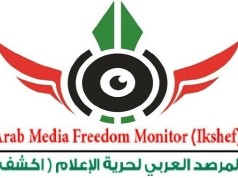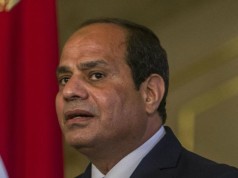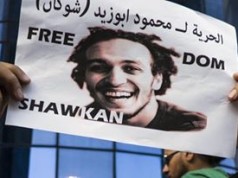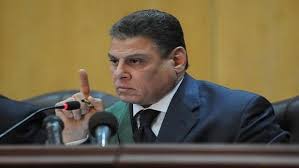
* Unprecedented mass execution verdict in Egypt against four journalists
* Widespread abuses against journalists during their work
* Journalists prevented from covering trial of EJS leaders
* Number of jailed journalists and media people hits 93, beside deportation of TV host Liliane Daoud
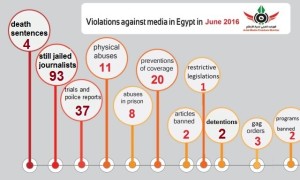
London – July 2, 2016
(Ikshef) – Although number of violations against media in Egypt was less in June than that in May and April, as there were 90 cases in June compared to 179 cases in April and a similar number in May, however, this month witnessed the harshest penalty of a mass execution verdict against four journalists for the first time in Egypt’s history, as well as the detention of two journalists, and sentencing three others to prison. On the other hand, one journalist was acquitted. This raises the number of journalist prisoners currently to 93.
Other violations that distinguish this month most is also the assaults en masse against journalists during their work, especially during coverage of demonstrations of public high school students in front of the Ministry of Education, and attacks on several journalists and sexual harassment of some female journalists, as well as individual attacks, including beating a journalist with pieces of wood by security officers, as well as tearing clothes of reporters by guards of public figures and government facilities, as well as preventing journalists from covering the trial of head of their syndicate and his fellow board members.
In a review of the violations of this month, there were arrests, verdicts of death sentences and imprisonment, where journalist Ahmed Hamouda Al-Sakhawi who works for Misr newspaper was arrested and interrogated for 7 hours by national security and turned to the prosecution which accused him of belonging to a terrorist group, although he was covering the secondary school examinations in northern province of Menofiya. Also, freelance journalist Rami Mohammed in the eastern province of Suez appeared after disappearing for ten days, despite a verdict to be released, however, he is still held.
Also, Cairo Criminal Court sentenced to death six people, including four journalists, bringing the number of those sentenced to death to five journalists, the same punishment that was issued against journalist and writer Walid Shalabi (verdict was overturned and a retrial is ongoing).
In the context of imprisonment verdicts, TV hosts Mohamed Nasser of Mekameleen TV station and Moataz Matar of ElSharq TV station were sentenced to two years in imprison on charges of incitement against state institutions. Also, Ali Ahmed Fouad, correspondent of Karmoz.com website in Alexandria, was sentenced to three years in prison. On the other hand, photojournalist Ali Abdeen of Al-Fajr newspaper was acquitted and released.
Regard violations within prisons, June witnessed 8 cases, most notably the attack on the journalist Musaab Hamid of Al-Hurriya wa Al-Adala newspaper, and 450 other prisoners jailed in Burj Al-Arab prison because of their hunger strike in protest against the attacks on detainees especially Alexandria students who faced blatant aggression.
A message by photojournalist Mahmoud Abu Zeid, known as Shawkan, which he sent from his cell revealed his suffering and suffering of his cellmates. He described the cell as 4 times 3 meters with 13 prisoners in it who spend 22 hours in and move only for 2 hours in an iron cage with rare sun rays.
Prisons witnessed usual violations of denial of medicines and food with few exceptions, and the long wait of families before visits, as well as the very short duration of visits and bad treatment by prison administration and harassment of detainees and their families during visits.
Courts also witnessed 37 complaints and pending lawsuits against many journalists, the most notable of these trials would be the trial of head of EJS yahya Qalash and his colleague members of the EJS council Gamal Abdel-Rahim and Khaled Al-Balshi, as well as the trial of former head of Central Auditing Authority Hisham Geneina on charges of spreading false news, beside the renewal of remand of journalist Ismail Al-Eskandarani abruptly and without notifying his lawyer or family for the second time.
Lawyer and MP Mortada Mansour filed legal reports against Al-Watan newspaper and its editor-in-chief, head of the board of directors and owner, as well as complaints against journalists Ahmed Musa and Mostafa Bakri on charges of incitement and spreading false news.
Physical attacks on journalists during their work continued, as June witnessed 11 assaults, among which cases of mass abuse by security forces especially what happened to journalists during coverage of demonstrations of high school students, where Mohammed Sharaf of Veto website and Dalia Mahmoud of Ahl Misr website were beaten, beside Yara Saleh of Albedaiah website, freelance photographer Essam Al-Sayyad and photographer Mohammed Fawzi of Journal Misr were beaten also in front of the Ministry of Education.
Journalists have also been attacked by guards of facilities and institutions. One case was in the city of Mansoura, where journalists were covering football match where famous footballer Mohamed El-Nenni was taking part, as whose guards assaulted journalists and tore their clothes. Also, a police lieutenant assaulted journalist Syed Ibrahim of veto website during his work in Faisal district in Giza. This is as well as sexual harassment against journalist Yara Saleh of Albedaiah website by security personnel during the coverage of demonstrations of high school students in front of the Ministry of Education.
Journalists have also been denied coverage which in 20 cases, most notably was during the trial of EJS leaders. This is as well the trial of the head of Muslim Brotherhood Dr. Mohamed Badie, and a session of trial of Hisham Geneina. This is beside other practices by people and guards of facilities and institutions.
June witnessed two cases of prevention of writing. One of them was in Shorouk newspaper where an article by Dr. Amr Hamzawy was not published. The other case was of writer Karem Yahya in Al-Ahram newspaper which refused publishing several of his articles.
As for gag orders, the list included three cases involved the murder case of the Attorney General Hisham Barakat, fire of exhibits store in Al-Haram area and sessions of Court of Cassation.
As for preventing TV hosts and programs, there were two cases, one of Liliane Daoud of ON TV after her contract ended, then security forces broke into her home and deported to her country Lebanon. On the other hand, a verdict was issued allowing rebroadcast of Faraeen TV channel and appearance of TV host Tawfiq Okasha.
Regarding legislations restricting freedoms, MP Mostafa Bakri submitted a request for the amendment of Article 68 of Law 96 to enable the president of the republic to appoint the members of the Supreme Press Council. Bakri is reacting to the unified media bill, which the government announced passing it to the department of legislation in the State Council in preparation for submitting it to the parliament.
June witnessed no travel bans.


